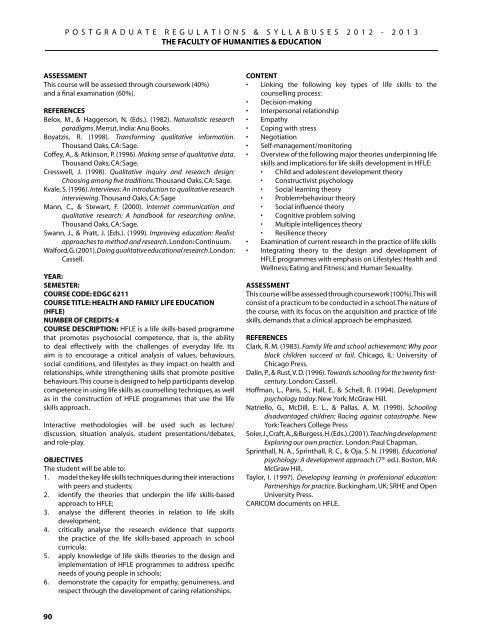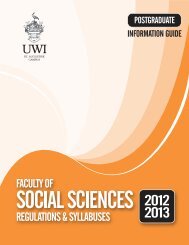Faculty of Humanities and Education (Postgraduate) - The University ...
Faculty of Humanities and Education (Postgraduate) - The University ...
Faculty of Humanities and Education (Postgraduate) - The University ...
Create successful ePaper yourself
Turn your PDF publications into a flip-book with our unique Google optimized e-Paper software.
90<br />
POSTGRADUATE REGULATIONS & SYLLABUSES 2012 - 2013<br />
THE FACULTY OF HUMANITIES & EDUCATION<br />
ASSESSMENT<br />
This course will be assessed through coursework (40%)<br />
<strong>and</strong> a final examination (60%).<br />
REFERENCES<br />
Belox, M., & Haggerson, N. (Eds.). (1982). Naturalistic research<br />
paradigms. Merrut, India: Anu Books.<br />
Boyatzis, R. (1998). Transforming qualitative information.<br />
Thous<strong>and</strong> Oaks, CA: Sage.<br />
C<strong>of</strong>fey, A., & Atkinson, P. (1996). Making sense <strong>of</strong> qualitative data.<br />
Thous<strong>and</strong> Oaks, CA: Sage.<br />
Cresswell, J. (1998). Qualitative inquiry <strong>and</strong> research design:<br />
Choosing among five traditions. Thous<strong>and</strong> Oaks, CA: Sage.<br />
Kvale, S. (1996). Interviews: An introduction to qualitative research<br />
interviewing. Thous<strong>and</strong> Oaks, CA: Sage<br />
Mann, C., & Stewart, F. (2000). Internet communication <strong>and</strong><br />
qualitative research: A h<strong>and</strong>book for researching online.<br />
Thous<strong>and</strong> Oaks, CA: Sage.<br />
Swann, J., & Pratt, J. (Eds.). (1999). Improving education: Realist<br />
approaches to method <strong>and</strong> research. London: Continuum.<br />
Walford, G. (2001). Doing qualitative educational research. London:<br />
Cassell.<br />
YEAR:<br />
SEMESTER:<br />
COURSE CODE: EDGC 6211<br />
COURSE TITLE: HEALTH AND FAMILY LIFE EDUCATION<br />
(HFLE)<br />
NUMBER OF CREDITS: 4<br />
COURSE DESCRIPTION: HFLE is a life skills-based programme<br />
that promotes psychosocial competence, that is, the ability<br />
to deal effectively with the challenges <strong>of</strong> everyday life. Its<br />
aim is to encourage a critical analysis <strong>of</strong> values, behaviours,<br />
social conditions, <strong>and</strong> lifestyles as they impact on health <strong>and</strong><br />
relationships, while strengthening skills that promote positive<br />
behaviours. This course is designed to help participants develop<br />
competence in using life skills as counselling techniques, as well<br />
as in the construction <strong>of</strong> HFLE programmes that use the life<br />
skills approach.<br />
Interactive methodologies will be used such as lecture/<br />
discussion, situation analysis, student presentations/debates,<br />
<strong>and</strong> role-play.<br />
OBJECTIVES<br />
<strong>The</strong> student will be able to:<br />
1. model the key life skills techniques during their interactions<br />
with peers <strong>and</strong> students;<br />
2. identify the theories that underpin the life skills-based<br />
approach to HFLE;<br />
3. analyse the different theories in relation to life skills<br />
development;<br />
4. critically analyse the research evidence that supports<br />
the practice <strong>of</strong> the life skills-based approach in school<br />
curricula;<br />
5. apply knowledge <strong>of</strong> life skills theories to the design <strong>and</strong><br />
implementation <strong>of</strong> HFLE programmes to address specific<br />
needs <strong>of</strong> young people in schools;<br />
6. demonstrate the capacity for empathy, genuineness, <strong>and</strong><br />
respect through the development <strong>of</strong> caring relationships.<br />
CONTENT<br />
• Linking the following key types <strong>of</strong> life skills to the<br />
counselling process:<br />
• Decision-making<br />
• Interpersonal relationship<br />
• Empathy<br />
• Coping with stress<br />
• Negotiation<br />
• Self-management/monitoring<br />
• Overview <strong>of</strong> the following major theories underpinning life<br />
skills <strong>and</strong> implications for life skills development in HFLE:<br />
• Child <strong>and</strong> adolescent development theory<br />
• Constructivist psychology<br />
• Social learning theory<br />
• Problem•behaviour theory<br />
• Social influence theory<br />
• Cognitive problem solving<br />
• Multiple intelligences theory<br />
• Resilience theory<br />
• Examination <strong>of</strong> current research in the practice <strong>of</strong> life skills<br />
• Integrating theory to the design <strong>and</strong> development <strong>of</strong><br />
HFLE programmes with emphasis on Lifestyles: Health <strong>and</strong><br />
Wellness; Eating <strong>and</strong> Fitness; <strong>and</strong> Human Sexuality.<br />
ASSESSMENT<br />
This course will be assessed through coursework (100%). This will<br />
consist <strong>of</strong> a practicum to be conducted in a school. <strong>The</strong> nature <strong>of</strong><br />
the course, with its focus on the acquisition <strong>and</strong> practice <strong>of</strong> life<br />
skills, dem<strong>and</strong>s that a clinical approach be emphasized.<br />
REFERENCES<br />
Clark, R. M. (1983). Family life <strong>and</strong> school achievement: Why poor<br />
black children succeed or fail. Chicago, IL: <strong>University</strong> <strong>of</strong><br />
Chicago Press.<br />
Dalin, P., & Rust, V. D. (1996). Towards schooling for the twenty firstcentury.<br />
London: Cassell.<br />
H<strong>of</strong>fman, L., Paris, S., Hall, E., & Schell, R. (1994). Development<br />
psychology today. New York: McGraw Hill.<br />
Natriello, G., McDill, E. L., & Pallas, A. M. (1990). Schooling<br />
disadvantaged children: Racing against catastrophe. New<br />
York: Teachers College Press<br />
Soler, J., Craft, A., & Burgess, H. (Eds.). (2001). Teaching development:<br />
Exploring our own practice. London: Paul Chapman.<br />
Sprinthall, N. A., Sprinthall, R. C., & Oja, S. N. (1998). <strong>Education</strong>al<br />
psychology: A development approach (7 th ed.). Boston, MA:<br />
McGraw Hill.<br />
Taylor, I. (1997). Developing learning in pr<strong>of</strong>essional education:<br />
Partnerships for practice. Buckingham, UK: SRHE <strong>and</strong> Open<br />
<strong>University</strong> Press.<br />
CARICOM documents on HFLE.

















